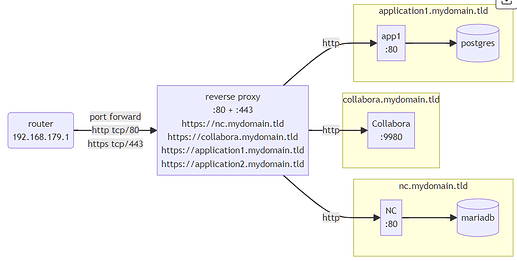Support intro
Sorry to hear you’re facing problems ![]()
help.nextcloud.com is for home/non-enterprise users. If you’re running a business, paid support can be accessed via portal.nextcloud.com where we can ensure your business keeps running smoothly.
In order to help you as quickly as possible, before clicking Create Topic please provide as much of the below as you can. Feel free to use a pastebin service for logs, otherwise either indent short log examples with four spaces:
example
Or for longer, use three backticks above and below the code snippet:
longer
example
here
Some or all of the below information will be requested if it isn’t supplied; for fastest response please provide as much as you can ![]()
Nextcloud version (eg, 29.0.5): docker latest
Operating system and version (eg, Ubuntu 24.04): fedora server
Apache or nginx version (eg, Apache 2.4.25): nginx
PHP version (eg, 8.3): docker version
The issue you are facing:
What I debugged:
Nextcloud office uses always https with collabora and I cannot disable it.
When I enable collabora ssl, nextcloud will not connect because collabora docker uses self signed cerificates.
When I disable collabora ssl and replace https with http and try nextcloud POST request via curl from nextcloud, it seems to return correct result.
I tried everything to disable https from nextcloud and nothing works.
Only workaround I can think of is put collabora behind nginx, where I have ssl certificates for my domain. But I don’t want to make my collabora public.
My question is how to disable this https? I have nextcloud behind the mentioned nginx, so I don’t need any ssl in nextcloud.
I have nextcloud, postgres, valkey, collabora in podman rootless containers,
If needed, I can provide quadlet files with all podman configurations.
The output of your Nextcloud log in Admin > Logging:
There are not even debug logs for this.
The output of your config.php file in /path/to/nextcloud (make sure you remove any identifiable information!):
only custom thing is now:
'overwritehost' => '****:1180',
and 'trusted_domains' =>
**** is my domain
this is needed otherwise I can't login to nginx (untrusted domain)
The output of your Apache/nginx/system log in /var/log/____:
Not applicable
Output errors in nextcloud.log in /var/www/ or as admin user in top right menu, filtering for errors. Use a pastebin service if necessary.
Error is that connection to collabora timed out
